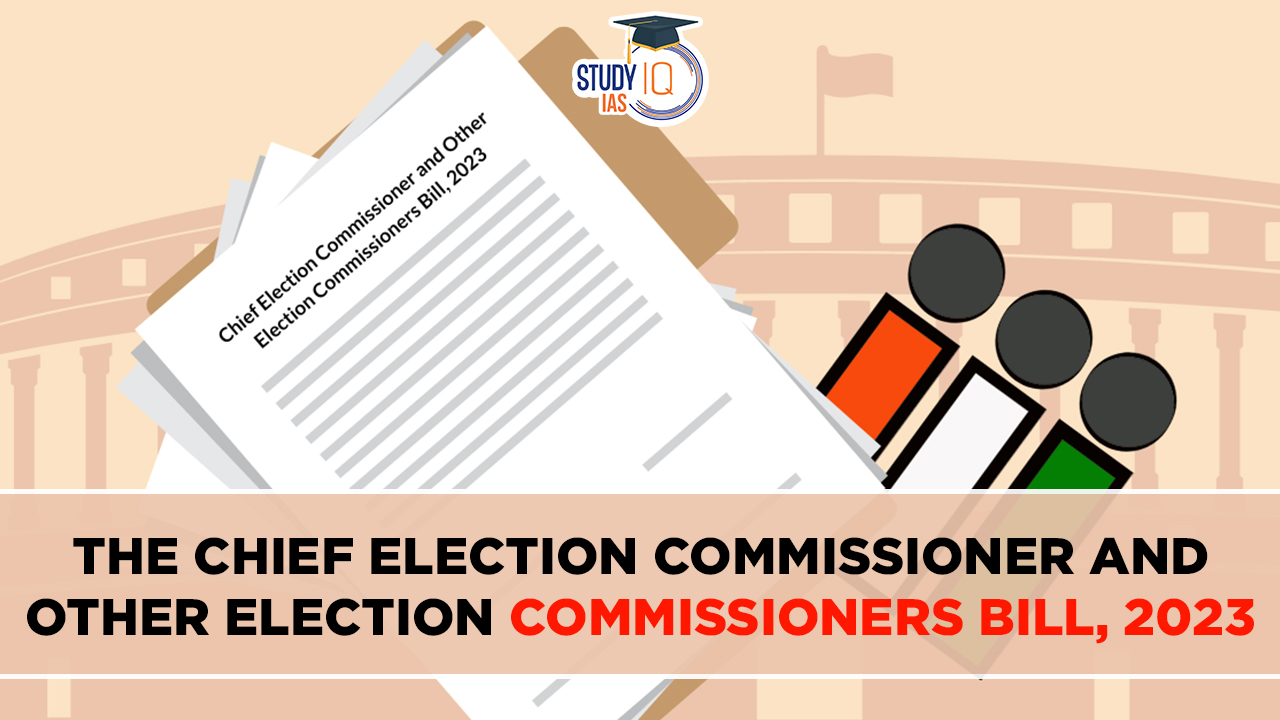Table of Contents
Context: The Chief Election Commissioner and Other Election Commissioners (Appointment, Conditions of Service and Term of Office) Bill, 2023 is listed for discussion in the upcoming special session of the Parliament.
About the Bill
- The Chief Election Commissioner and Other Election Commissioners (Appointment, Conditions of Service and Term of Office) Bill, 2023, was introduced in Rajya Sabha in August 2023.
- It repeals the Election Commission (Conditions of Service of Election Commissioners and Transaction of Business) Act, 1991.
Key Provisions of the Bill
Appointment of Election Commissioners
| Earlier | Now |
| As per Article 324 of the Constitution, the Election Commission consists of the Chief Election Commissioner (CEC) and such number of other Election Commissioners (ECs), as the President may decide. The CEC and other ECs are appointed by the President. | The Bill specifies the same composition of the Election Commission. It adds that the CEC and other ECs will be appointed by the President on the recommendation of a Selection Committee. |
| Selection Committee |
|
| Search Committee |
|
| Qualification of CEC and ECs |
|
| Conduct of business |
|
Salary and allowances
| Earlier | Now |
| The 1991 Act provides that the salary of the ECs will be equal to that of a Supreme Court judge. | The Bill provides that salary, allowance, and service conditions of the CEC and other ECs will be the same as that of the Cabinet Secretary. |
Term of office
| Earlier | Now |
|
|
Removal and Resignation
- Under Article 324 of the Constitution, the CEC can only be removed from his office in a manner similar to that of a Supreme Court judge. An EC can only be removed from office on the recommendation of the CEC. The Bill retains this removal procedure.
- Further, the 1991 Act provides that the CEC and other ECs may submit their resignation to the President. The Bill has the same provision.
What are the Concerns with the Bill?
- Power Distribution: The committee’s power balance, where the Prime Minister and a nominated Cabinet Minister hold majority sway, leaves the Leader of the Opposition with a minority vote. This raises questions about the committee’s fairness and its ability to ensure independence in the selection process.
- Impact on Electoral Governance: The perception of Executive influence in the selection process may undermine the Commission’s ability to conduct elections impartially.
- Constitutional Implications: The bill could create a peculiarity where the Constitution stipulates that a CEC can only be removed in a manner similar to that of a Supreme Court Judge, but their service conditions align with those of a Cabinet Secretary. This misalignment raises questions about the constitutional framework governing the Election Commission.
Way Forward
- Before passing the Bill, extensive consultations with opposition parties, legal experts, and stakeholders should be conducted to address diverse concerns comprehensively.
- The government should reconsider the Selection Committee’s composition, possibly giving the opposition a greater role to ensure fairness.
- Including independent experts, jurists, and civil society representatives in the Search Committee or as Selection Committee observers could enhance the process’s credibility.


 Daily Quiz 18 April 2025
Daily Quiz 18 April 2025
 OSSC CGL Syllabus 2025 and Exam Pattern ...
OSSC CGL Syllabus 2025 and Exam Pattern ...
 AI and its Regulation in India, Limitati...
AI and its Regulation in India, Limitati...





















